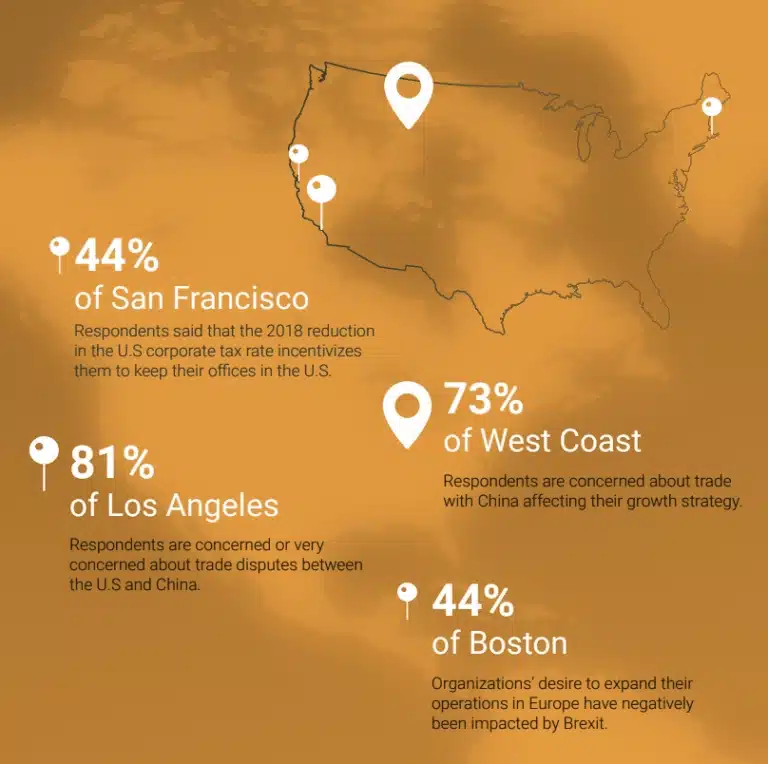New Research Sheds Light on Top Global Expansion Concerns of US Business Decision Makers
The “Going Global” report from Censuswide and Tipalti explores US businesses’ top international expansion challenges and how to overcome them
San Mateo, CA, June 20, 2017 – Today, Censuswide and Tipalti announced findings from a survey of over 500 decision makers at mid-sized businesses in the U.S. about the challenges they’ve faced when expanding their company’s supply chain or geographic presence internationally. With a strong economy at home, and economic and political uncertainties abroad, U.S. companies are thinking twice and ensuring they have the right infrastructure in place before scaling and going global.
Global events from Brexit to trade disputes between the U.S. and China are affecting U.S. organizations’ international growth strategies. For example, 68% of respondents are worried about trade disputes between the U.S. and China while 70% are concerned about the renegotiation of international trade agreements like NAFTA.
With the General Data Protection Regulation (GDPR) having gone into effect in May 2018, 65% are concerned about becoming compliant. In fact, over three quarters of organizations (76%) aren’t confident that they are ready to be compliant with GDPR and, as a result, it is delaying their expansion into Europe. In addition, 21% are still deciding if it’s worth becoming compliant to enable European expansion.
Another source of uncertainty when it comes to business growth in to Europe is Brexit. Although it’s been two years since the U.K. voted to leave the European Union, 61% of respondents are concerned about the impact Brexit could have on their businesses if they pursue transatlantic expansion. As a result, almost a third of respondents (29%) said Brexit is negatively impacting their organization’s desire to expand its operations in Europe.

Technology is becoming more globally-attuned and is able to execute with greater consistency and accuracy across the entire operation, even in the face of the dynamic changes in the world. The right globally-enabled technology infrastructure can be a substantial advantage businesses can wield to achieve greater economies of scale and reduce manual, show-stopping efforts that hinder international growth.
Chen Amit | CEO and Co-founder, Tipalti

“Brexit has impacted how my company thinks about international growth and I’ve seen a similar impact on a lot of other business decision makers I’ve spoken to that are taking a ‘wait and see’ approach when it comes to making decisions about their international business structure. For companies that before Brexit were considering London as their EMEA hub, it’s causing a delay in that decision because of course companies want to be sure they can easily sell in to the EU from whatever hub city is chosen,” said Dash Victor, Controller at Docker.
Adding to these macroeconomic and political concerns is that only 11% feel that their organization is qualified to successfully address aspects and challenges of global expansion. The aspects of global expansion that companies feel least qualified to successfully address include:
- Knowledge of local markets (33%)
- Different tax codes (32%)
- Foreign exchange volatility (31%)
- Hiring to support international expansion (31%)
- Compliance and regulatory risk (30%)
To address these concerns successfully and expand internationally, organizations will need to make changes to internal processes, such as using technology that will more easily enable international growth (56%), bringing on vendors that have the capability to work smoothly in new markets (50%), and establishing back-office operations around international realities (40%).
“When we first expanded outside the U.S., we quickly realized it was going to be nearly impossible for us to understand the banking systems and tax regulations in all the countries we wanted to operate in,” said Rob Lenderman, Founder and Chief Operations Officer at Boost Media. “We now pay 20-30 countries on a regular basis thanks to a focus on getting our back-office technology ready. If we hadn’t taken this approach, we would have had to choose 3-4 countries to specialize in, limiting the quality and quantity of people we could work with outside the U.S. The biggest thing a company looking to expand globally should do is put systems in place that solve problems for them, so you can know that, for example, even if India suddenly changes their financial rules and regulations, you’re still covered.”
“It was surprising to me that still 44% of organizations plan to scale their financial operations across different geographies by hiring more accounting team members. At Touch of Modern, we used technology to scale our financial operations globally without needing to add accounting headcount and saved a lot of time and money in the process. A global growth strategy that relies on doubling, tripling, then quadrupling the accounting team to keep up with demand can’t remain competitive in the new age of technology-driven operations,” said Jonathan Wu, Co-Founder of Touch of Modern.
“Technology is becoming more globally-attuned and is able to execute with greater consistency and accuracy across the entire operation, even in the face of the dynamic changes in the world,” said Chen Amit, CEO and Co-founder of Tipalti. “The right globally-enabled technology infrastructure can be a substantial advantage businesses can wield to achieve greater economies of scale and reduce manual, show-stopping efforts that hinder international growth.”
About the study
The Going Global survey was conducted in the spring of 2018. Censuswide surveyed over 500 decision makers from a wide variety of industries across a range of company sizes.